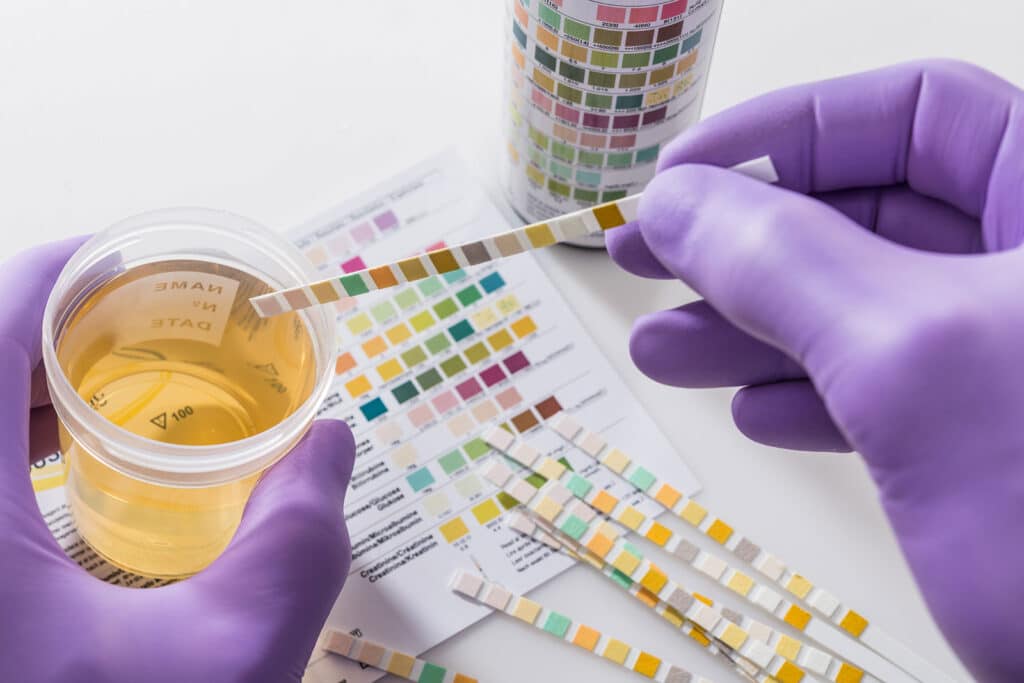With the increasing interest in herbal remedies, kratom (mitragyna speciosa) has gained attention. This leaf, from an evergreen coffee tree native to Southeast Asia, has been used traditionally for its stimulant and opioid-like effects. This raises the question: does kratom use show up on a drug test?
Table of Contents
Does Kratom Show Up on a Drug Test?
Generally, kratom is not detectable on a standard 5-panel drug test, the most common type used by employers and law enforcement. This standard test screens for substances like THC, cocaine, opiates, amphetamines, and phencyclidine.
However, while not included in standard panels, kratom can be detected in some drug tests. Although standard blood and urine tests may not pick it up, specialized tests exist specifically designed to detect kratom and its metabolites. These tests, such as the kratom 10-panel test, can identify even small amounts of kratom alkaloids in a person’s system.
Detecting Kratom in Drug Tests
The detectability of kratom depends on the specific test. While routine drug screenings typically don’t include kratom, certain blood and urine tests, when specifically targeted, can reveal kratom use. The presence of kratom metabolites can also extend the detection window, meaning kratom may be detectable for a longer period after use. Therefore, while not universally screened for, kratom isn’t undetectable.

Urine Test
Traces of kratom can be found in the urine using a 10, 12, or 16-panel drug test. These traces can last in your system for up to seven days.
Blood Test
If someone uses kratom regularly, there’s a big chance kratom will last in their system for an extended period, long enough to be detected in a blood test. However, blood tests are less likely to be used than urine tests to detect kratom in your system.
This is because they have a small detection window from a few hours to a few days, and in general, they’re considered less accurate than urine tests.
Saliva Test
Although saliva testing is common for other drugs, there’s no test available for kratom. So, kratom might not be detectable in your saliva, even if you’ve consumed the drug within a few hours.
Hair Follicle Test
Hair follicle testing is common for most types of drugs, but there’s no test available for kratom. Although other drugs can be detected in hair follicles for up to 90 days, more research is needed to see if this testing method can detect kratom.
| Test Type | Detectability |
| Urine Test | Detectable in 10, 12, or 16-panel tests; lasts up to 7 days |
| Blood Test | Detectable for a few hours to a few days; less common than urine tests |
| Saliva Test | No available test for kratom in saliva |
| Hair Follicle Test | No available test for kratom in hair; more research needed |
Mitragynine, the primary alkaloid in kratom, acts as a partial opioid agonist, binding to opioid receptors and producing effects similar to opioids. While some researchers classify kratom as an opioid due to this interaction, the classification remains debated.
Factors affecting Test Results
Several factors influence how long kratom remains detectable in your system.
- Substance abuse, especially alcohol use, can similarly extend the effects of kratom and potentially increase the likelihood of experiencing side effects. Whether kratom is taken on an empty stomach or not is less of a factor in how long it stays in the system compared to the other factors listed above.
- Age plays a role. Younger people tend to process substances more quickly than older people.
- Body fat also matters. Individuals with a higher fat percentage may retain kratom for a longer period, as it can be stored in fatty tissues.
- Dosage is a significant factor. Higher doses of kratom will generally remain in your system longer than low doses.
- Metabolism influences how quickly your body processes kratom. People with slower metabolic rates may process it less efficiently.
- Health conditions, particularly liver issues, can impact kratom breakdown. A compromised liver may struggle to metabolize kratom effectively.
- Combining kratom with certain medications can also prolong its effects and slow its elimination from the body.
What Are the Side Effects of Kratom?
Although a lot of people believe that kratom can have a lot of benefits, especially if they’re trying to quit opiates, researchers believe that the side effects and safety concerns of this drug are more than the potential benefits.

Some side effects are more common with higher dosages, so it’s best to avoid this drug completely. People usually experience these effects five to ten minutes after taking kratom, but they can last for two to five hours.
Moreover, the side effects can be present in an infant breastfed by a mother who took kratom. Side effects might be worse when someone mixes kratom with other pain medications.
Here are the most common side effects of kratom.
- Weight loss
- Dry mouth
- Muscle pain
- Chills
- Nausea
- Vomiting
- Constipation
- Headaches
- Changes in urination
- Liver damage
- Drowsiness
- Dizziness
- Hallucinations
- Confusion
- Depression
- Breathing suppression
- High blood pressure
- Seizures
- Coma
- Death

Conclusion
Kratom, while a herbal extract, is not without risks. Originally used for its stimulating effects, higher doses can produce opium-like effects, leading some to misuse it for managing opioid withdrawal. However, kratom is not a safe alternative and carries a range of severe side effects. While it may be detectable in specialized drug tests for up to a week, standard drug panels typically do not screen for it. Regardless of detection windows, it’s crucial to avoid kratom due to the potential for serious health consequences, including seizures and even death, particularly with higher doses.
If you or someone you know is struggling with kratom use or other substance abuse issues, seeking help is essential. Long Island Treatment Center offers addiction treatment and detox programs. Effective treatment options are available to support recovery and improve mental health. Please call Long Island Treatment Center to learn more about kratom, its effects, and the available resources for help.
FAQ
What Is Kratom?


